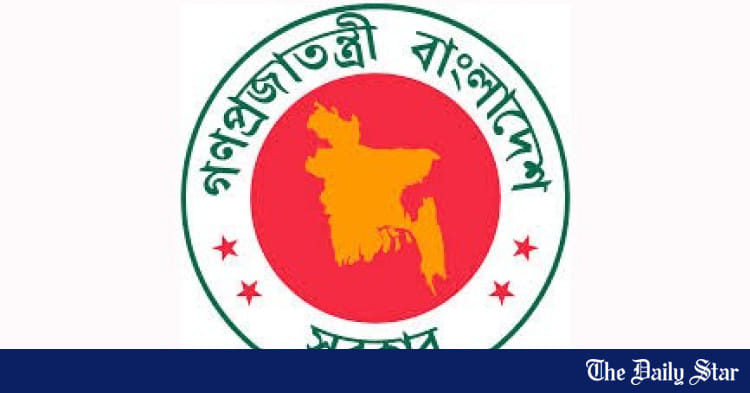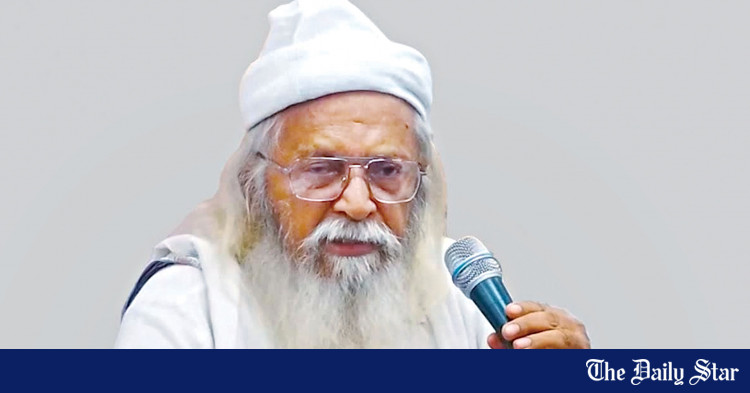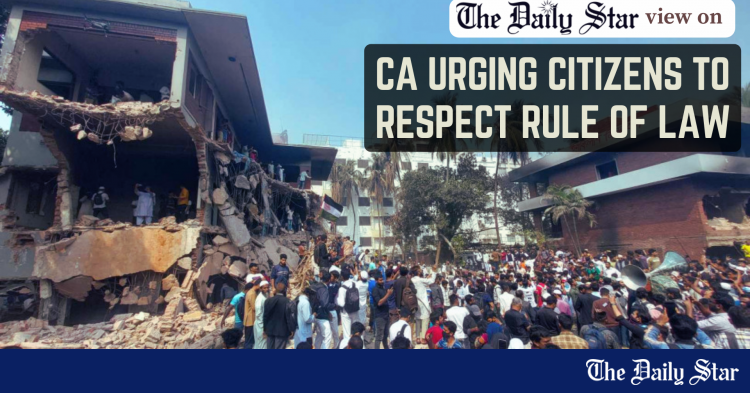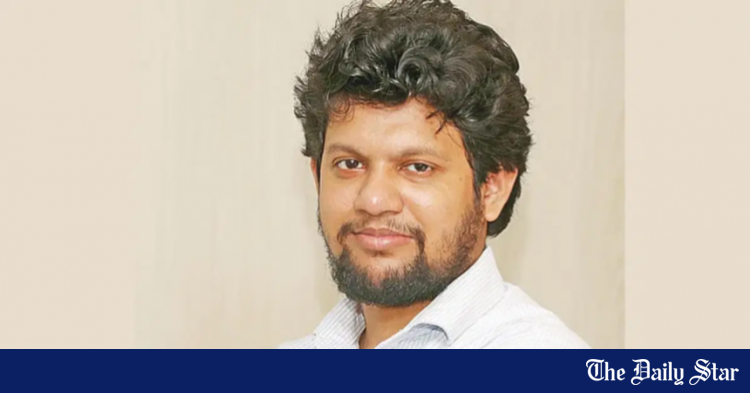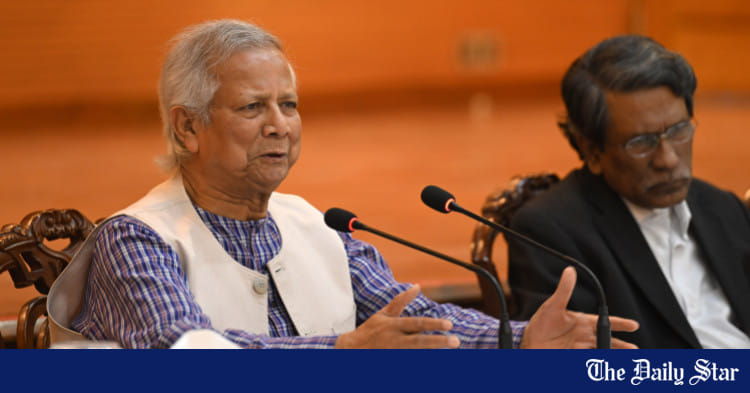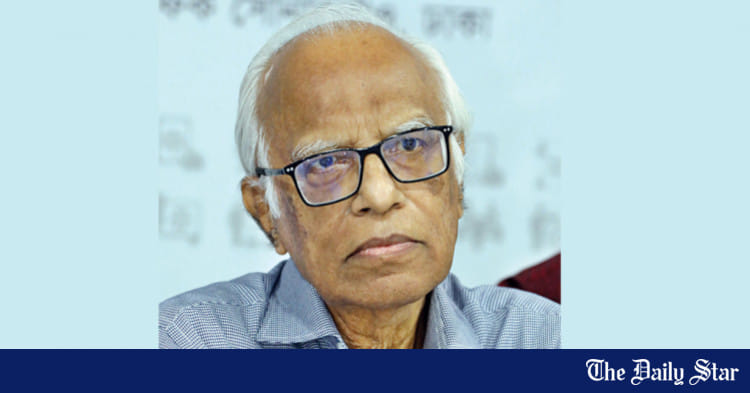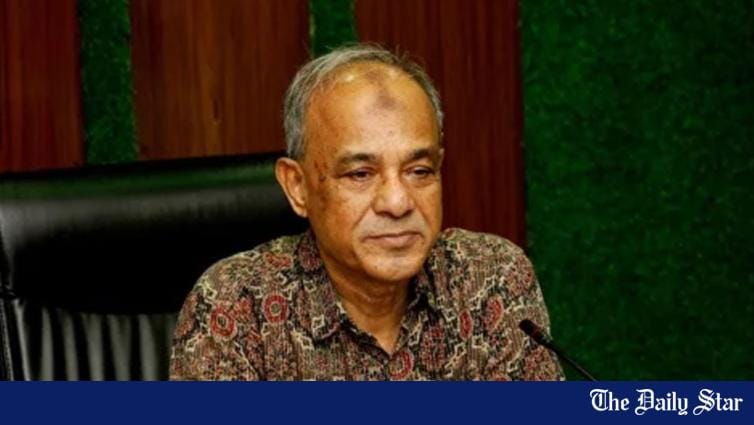Saif
Senior Member
- Joined
- Jan 24, 2024
- Messages
- 15,397
- Reaction score
- 7,874
- Nation

- Residence

- Axis Group


CA's concern about lawlessness
This is for the first time that Chief Adviser Prof Muhammad Yunus has not only asserted his firm stand on the law and order situation but also issued a definite instruction to deal with its slide with an iron hand. Earlier the Nobel Laureate for peace simply exhorted all for maintenance of social p
CA's concern about lawlessness
FE
Published :
Feb 05, 2025 22:22
Updated :
Feb 05, 2025 22:22

This is for the first time that Chief Adviser Prof Muhammad Yunus has not only asserted his firm stand on the law and order situation but also issued a definite instruction to deal with its slide with an iron hand. Earlier the Nobel Laureate for peace simply exhorted all for maintenance of social peace and stability in the interest of the nation. But there are elements---political or anti-social--- bad to the bone, who are mentally bent on scoffing at the most fervent appeal. They do not appreciate the language of rationality and change; they need an altogether different kind of treatment. The chief adviser might have to struggle to come to terms with the hard reality and finally he has done. But his urgency also betrayed a sense of something ominous. The threat of sabotage and counterrevolution has often been mentioned by the functionaries of the incumbent government and politicians in their speeches. But when the chief adviser asks security agencies to stay alert, its import is grave and should be taken seriously.
Usually this is an area the home minister, here the home adviser, is in charge of. But in this case, the chief adviser has not only hoisted the danger signal but also instructed to create a command centre for tapping any untoward developments anywhere in the country. In fact, the home ministry itself is responsible for coordinating internal security. Now the chief adviser has intervened, making it clear that the current arrangement for security is not enough. Hence his instruction, it seems, for creation of a command centre for better coordination of monitoring and prompt actions. The chief adviser has made it clear that the advantage of digitisation has to be used to the maximum in this task. In this respect, his suggestion for acceptance of first information report (FIR) filed online by a complainant can facilitate the process.
So far so good. But apart from painting the spectre of a backlash from the deposed forces, the government has not shown its clear intent to deal with some burning issues for their early solution and not allowing those to escalate and create each a precedent for anarchy. The labour unrest and aggressive student agitation for disaffiliation of seven government colleges from the University of Dhaka and elevation of one of those to the status of a university are the two most vexing of many such organised protests. There was no difference between the political government and this interim government in handling the problems and allowing those to mount. Engagement with the aggrieved parties courtesy of astute negotiations could avoid escalation of the anarchic developments infringing on the rights of the general public. There is still time for such negotiations.
Voices of resentment and even opposition to the government's inaction have already been raised, denting its popularity. Some stake-holders seem to be in a hurry to bypass the comprehensive reform process in favour of an election. Riding on popular support, the government could use its good offices for an amicable solution to the most burning issues, thus stemming lawlessness right from the beginning. That would have discouraged insane agitation, on the one hand, and helped avoid public sufferings as well as loss of property and work hours, on the other. Lawlessness would have effectively been discouraged.
FE
Published :
Feb 05, 2025 22:22
Updated :
Feb 05, 2025 22:22
This is for the first time that Chief Adviser Prof Muhammad Yunus has not only asserted his firm stand on the law and order situation but also issued a definite instruction to deal with its slide with an iron hand. Earlier the Nobel Laureate for peace simply exhorted all for maintenance of social peace and stability in the interest of the nation. But there are elements---political or anti-social--- bad to the bone, who are mentally bent on scoffing at the most fervent appeal. They do not appreciate the language of rationality and change; they need an altogether different kind of treatment. The chief adviser might have to struggle to come to terms with the hard reality and finally he has done. But his urgency also betrayed a sense of something ominous. The threat of sabotage and counterrevolution has often been mentioned by the functionaries of the incumbent government and politicians in their speeches. But when the chief adviser asks security agencies to stay alert, its import is grave and should be taken seriously.
Usually this is an area the home minister, here the home adviser, is in charge of. But in this case, the chief adviser has not only hoisted the danger signal but also instructed to create a command centre for tapping any untoward developments anywhere in the country. In fact, the home ministry itself is responsible for coordinating internal security. Now the chief adviser has intervened, making it clear that the current arrangement for security is not enough. Hence his instruction, it seems, for creation of a command centre for better coordination of monitoring and prompt actions. The chief adviser has made it clear that the advantage of digitisation has to be used to the maximum in this task. In this respect, his suggestion for acceptance of first information report (FIR) filed online by a complainant can facilitate the process.
So far so good. But apart from painting the spectre of a backlash from the deposed forces, the government has not shown its clear intent to deal with some burning issues for their early solution and not allowing those to escalate and create each a precedent for anarchy. The labour unrest and aggressive student agitation for disaffiliation of seven government colleges from the University of Dhaka and elevation of one of those to the status of a university are the two most vexing of many such organised protests. There was no difference between the political government and this interim government in handling the problems and allowing those to mount. Engagement with the aggrieved parties courtesy of astute negotiations could avoid escalation of the anarchic developments infringing on the rights of the general public. There is still time for such negotiations.
Voices of resentment and even opposition to the government's inaction have already been raised, denting its popularity. Some stake-holders seem to be in a hurry to bypass the comprehensive reform process in favour of an election. Riding on popular support, the government could use its good offices for an amicable solution to the most burning issues, thus stemming lawlessness right from the beginning. That would have discouraged insane agitation, on the one hand, and helped avoid public sufferings as well as loss of property and work hours, on the other. Lawlessness would have effectively been discouraged.

